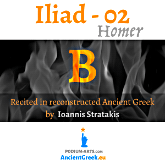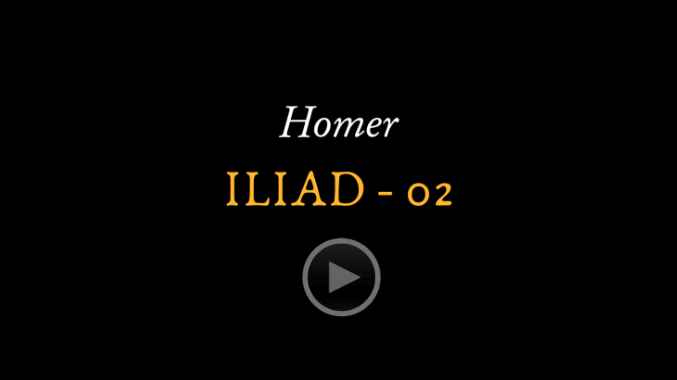• Iliad 02 •
• Homer •

Duration: 1 hour 10 min
Unabridged
Recorded: 2024
Price : $/€ 24
About rhapsody 02 of the Iliad
In the second rhapsody of Homer’s Iliad, Zeus sets his plan to honor Achilles in motion by sending a deceitful dream to Agamemnon, the Greek commander. The god of Dreams, disguised as Nestor, visits Agamemnon and tells him that Zeus has promised victory if the Greeks launch an attack on Troy the following day. Agamemnon, convinced by the dream, eagerly calls an assembly of his chieftains, where he recounts the message and orders the Greeks to prepare for battle.
However, Agamemnon tests the resolve of his men by suggesting they abandon the war and return home. Surprisingly, the weary Greek soldiers respond with enthusiasm, rushing toward their ships. Hera, alarmed by this development, sends Athena to intervene. Athena persuades Odysseus to restore order, and he shames the Greeks into staying by reminding them of the prophecy foretelling Troy’s eventual fall after nine years of battle. The army regains its focus, but not before Odysseus harshly reprimands Thersites, a common soldier who openly criticizes Agamemnon and urges the Greeks to leave.
After calming the troops, Agamemnon, Odysseus, and the other leaders prepare the Greeks for battle. They make sacrifices to the gods, hoping for their favor in the upcoming fight. Agamemnon notably prays for victory, asking Zeus to allow him to kill Hector and destroy Troy, though the audience knows Zeus has no intention of granting this request.
The second half of the book shifts to the Catalogue of Ships, an extensive list of the Greek contingents, their leaders, and the regions from which they hail. This roll call of forces emphasizes the vast size of the Greek army, which, despite its strength, still struggles to overcome Troy without the help of Achilles.
A summary of the second rhapsody can be found at MoAnInc
Homer
Though Homer doesn't need an introduction, in case you'd like to refresh your knowledge about his life and work, you can read enough in published books, or online by consulting websites like: the Center for Hellenic Studies of Harvard University (using their search field), Encyclopaedia Britannica, the "Living Poets" website, even Wikipedia, Biography.com, or elsewhere.
About the audiobook
 The recording contains the unabridged Ancient Greek text of the 2nd rhapsody.
The recording contains the unabridged Ancient Greek text of the 2nd rhapsody.
This recitation is trying to find a balance between dramatisation and metrical correctness. I've avoided excess on both sides: not to render it as mechanically rhythmic as it usually happens in educational context on all levels and, not over-dramatise it, as is often needed in live performances in larger venues. I hope this is a proper approach for this medium.
After purchase you will be able to download the relevant mp3 file (audiobook) or, when ready the .mp4 + .srt (videobook + captions)
You can listen to a short sample in the following video.
